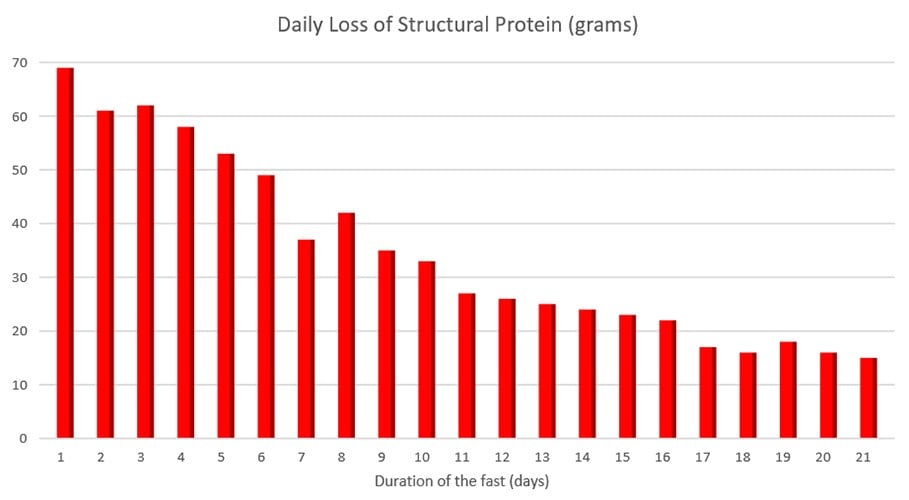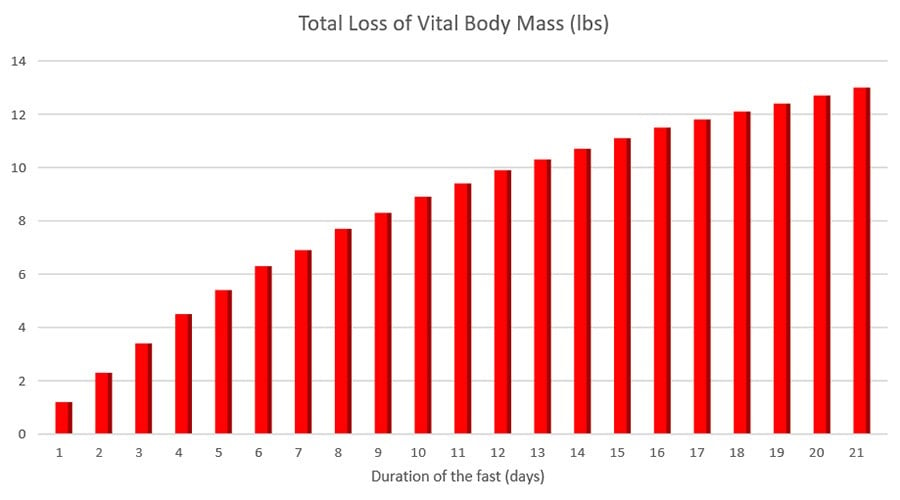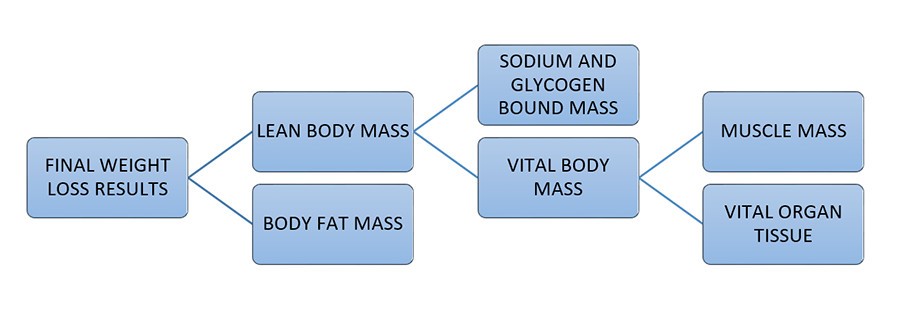Most people in the water fasting community have no clue on how much muscle mass it’s actually possible to lose during a water fast.
At best, they can tell you that our bodies are very efficient at preserving our muscle mass during a water fast. But I have yet to meet anyone who knows the exact numbers.
In this article, I have relied on modern science to put an end to this confusion. If you read it all the way through, you will understand how much muscle mass you can expect to lose during a water fast (depending on how long you intend to fast).
But first, I want to quickly explain why we lose muscle mass during water fasting in the first place.
Why do we lose muscle mass during water fasting?
Some animals, like bears during winter hibernation, can survive without food for a very long time. And the amazing thing is, they can do it without any detectable loss of muscle mass [1].
Humans, on the other hand, we tend to lose a lot of muscle mass during starvation. Roughly put, that’s because our brains require some special “brain fuel” to survive [2].
Because we’re not eating any food during a water fast, our bodies have no choice but to start burning away some of our “structural protein” (to keep powering our hyper-intelligent brain).
Those structural proteins are the very basic building blocks of your muscles, which means you’re bound to destroy some of your muscle mass during a water fast.
Explaining all this in great detail would be beyond the scope of this article. So let’s just take a look at how much of those structural protein you can expect to lose during a water fast.
The daily loss of structural protein on a water fast
In one starvation study [3], they measured the amount of protein obese people lost during a 21-day water fast.
I’ve adapted the data from that study into this daily protein loss chart:
You can see that on the 1st day of the water fast (the first bar on the left), the loss of structural protein was the highest (69 grams).
By the end of the 21-day fast (the last bar on the right), the loss of structural proteins was reduced by almost 80% (to 15 grams).
This shows that our bodies can adapt to starvation extremely well. In order to keep you alive as long as possible, your body keeps slowing down the destruction of your vital body mass.
But ultimately, you’ll lose much more muscle mass than this small amount of structural protein.
Why?
Because your muscle tissue is actually made of only about 20% of protein, while the rest of it is water [4].
The total loss of muscle mass on a 21-day water fast
Here’s another chart I’ve created based on that 21-day starvation study:
This chart shows the total vital body mass you can expect to lose (in pounds), depending on how long you plan on fasting.
If you plan to fast for 6 days (bottom axis), the chart can tell you that you could be losing a little over 6 pounds of your vital body mass (left axis).
If you plan on doing a 13-day water fast, you could lose a little over 10 pounds of your vital body mass and a 21-day water fast could set you back by full 13 pounds of vital body mass.
While this chart can tell you how much vital body mass you can expect to lose during a water fast, it can’t tell you how much total weight you can expect to get rid of.
Maybe you already picked up on this, but I am no longer talking about muscle mass.
Instead, I keep talking about your “vital body mass”, so let me quickly explain the difference between the two.
You lose much more than just your muscle mass
When it comes to understanding your final weight loss results after a water fast, things can easily get a bit confusing.
Just take a look at all the different kinds of weight you’ll end up losing if you decide to do a water fast.
At the highest level, you will be losing your body fat mass and your lean body mass (also called non-fat, or fat-free body mass).
The lean body mass you lose will include some of your sodium and glycogen bound water weight, and some of your vital body mass.
And finally, the vital body mass you lose will include more than just your muscle mass.
Because some of those protein, the basic building blocks of your vital body mass, will also come from your vital organ tissue [5].
And what’s the biggest problem when it comes to destroying the basic building blocks of both your muscles and vital organs?
Remember, the most important muscle and vital organ in your body that could suffer because of this, is your heart.
I won’t get into more detail here, but you can read all about the health dangers of water fasting here).
Now, let’s look at some of the things you can do to avoid losing your vital body mass while fasting.
How to prevent the loss of muscle mass during fasting?
The most obvious solution to avoid the destruction of your vital body mass is not to do a fast in the first place. If you were considering doing a water fast for weight loss, you can simply go with any of the countless less restrictive diets out there.
Just make sure to do your research, because not all weight loss diets are designed to protect your vital body mass.
But if you’re still interested in going through with a water fast, at least consider looking into intermittent fasting, alternate day fasting, or even muscle sparing fasting as safer alternatives to water fasting.
Muscle sparing fasting, for one, can actually be done without any solid food and can give you that “pure” feeling of fasting (while still helping you avoid that unnecessary destruction of your vital body mass).
My goal for this article was to help you understand water fasting is no fairy tale. Knowing that you could actually destroy up to 13 pounds of muscle mass AND vital organ tissue (on a 21-day water fast), you’re hopefully going to at least consider the alternatives.
Now, I want to ask a small favor of you. If you know absolutely anyone who has ever done, or has at least considered doing a water fast, please share this article with them.
Don’t do it for me, or even for yourself. Do it for them and for their safety.
Featured photo credit: Pixabay – 926663 via pixabay.com















































